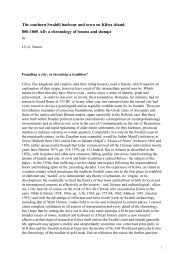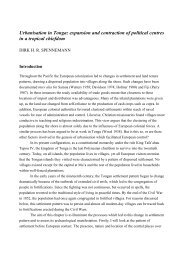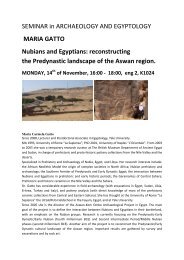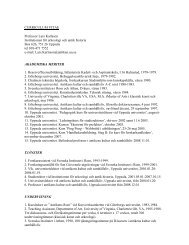Beowulf - Institutionen för arkeologi och antik historia
Beowulf - Institutionen för arkeologi och antik historia
Beowulf - Institutionen för arkeologi och antik historia
You also want an ePaper? Increase the reach of your titles
YUMPU automatically turns print PDFs into web optimized ePapers that Google loves.
current, throughout the poem as well as in its climax, then it is also possible to see the<br />
reoccurrence of the word as a sign that the good has been restored. This, in its turn,<br />
means that the poem starts by pointing out what must in the given situation be good,<br />
namely to fight and not pay tribute. This decision eventually brings those who do the<br />
good into a severe crisis and we come close to the breakdown of the ideal, but as<br />
there are still men who are prepared to do the good, which is actually to honour a<br />
bargain with a master who has been good to you, and for whom one is expected to<br />
give one’s life in order to make the deal fair and even, the ideal can be saved. The<br />
East-Saxons as a people are represented by 20 or so men, similar to the Geats, who<br />
are represented by <strong>Beowulf</strong> and his 14 men, and they overcome the crisis and restore<br />
the ideal by sacrificing themselves. For a man to be caught up by age and to be<br />
lacking in judgement and physical strength it is a harsh fate to be called upon to be<br />
good, but that is certainly no reason to depart from the good. National football teams<br />
and their managers, modern equivalents of Byrhnoth and his men, can count themselves<br />
fortunate in that they risk only defamation by media, the murder of Escobar<br />
being the exception.<br />
Being called upon to be good often restricts one’s possibilities of action. The poem<br />
shows this splendidly by letting Byrhtnoth make the initial decision to fight the Danes.<br />
This is a good decision since to Byrhtnoth it is the right way in which to repay his king,<br />
but it leads to other decisions which make it easy to be wise after the event and at the<br />
same time quite pointless, since earlier that day, in the assembly before the decision<br />
was taken, Offa—in what was probably a most typical epic digression in the unknown<br />
beginning of the poem—had already told the Earl what would probably happen if his<br />
men were tried in battle against the Danes.<br />
The good is in other words best in the long run and it may lead to immediate disaster<br />
for the individual or a hard-won victory for one side or the other, since it must not be<br />
forgotten that also the Danes acted in a good way, not least the young men who went<br />
forth and got themselves killed trying to get at Byrhtnoth.<br />
It seems clear that in a crisis the only right thing to do is to return whatever benefits<br />
or gifts we have received by sacrificing our lives for the sake of our benefactor. Seen in<br />
a long perspective the crisis for the prehistoric ideal of the good in the battle situation is<br />
no doubt a sign of mental health and, to many, a proof of the development of society,<br />
but probably even in prehistoric times the normality of being good was hardly a matter<br />
of killing as many opponents as possible before getting killed oneself.<br />
It is worth wondering if the author of Maldon was aware of his own use of the word<br />
good. I think that there can be little doubt that he knew that he was writing about a<br />
mainly military ideal of the good and that he felt obliged to connect it with a Christian<br />
goodness, at least formally. God, moreover, is a king whose thane it is worth being; he<br />
grants the good in the same way as a worldly king and whatever Heaven may look like<br />
Byrhtnoth prefers to belong to God. Using the word good probably occurred quite<br />
naturally to the author when he reached the most solemn parts of his poem—when<br />
76








